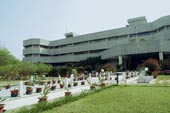 |
This fiscal is going to be busy to say the least for the Indian Institute for Coal Management (IICM). The wish list includes programmes on the Right to Information Act, tribal customs, laws and disputes, advocacy for reproductive and sexual health, human resources as business partners, and functional-skill programmes for environment management.
There are many more — to be precise 100-odd — that the institute is set to complete during the current fiscal.
For this fiscal (yes, they follow a financial year) there has been a bonus — collaborative programmes that raked in the much-needed moolah. The institute managed to earn some foreign exchange when it trained eight officials from Petrobangla — the Bangladesh-equivalent of ONGC.
“It is just the beginning. We are expecting many more such groups,” said Professor Sudeep Ghosh, executive director of IICM. Needless to say, such ventures helped the institute to become financially viable. Promoted by Coal India Limited or CIL, IICM was set up in 1994 to provide training facilities to executives in the coal sector.
Today, registered as an educational society, it has been given functional autonomy and is run by an independent board of governors.
A neat institution with a small inter-disciplinary faculty, the institute slowly has made its presence felt. No longer the small fry, it is regularly approached by the state government, other public sector undertakings, such as Neyveli Lignite Corporation and NTPC and NGOs, for training its personnel.
Then there are medical associations and judicial authorities that have also come forth for qualitative collaborative programmes with the IICM.
To top it the Bangladesh government showed interest in dealing with the IICM and soon the institute may reach an agreement with Mozambique. In a world of broken promises there are strong reasons for IICM to be proud of its achievements. So far there have been no lapses and certainly no broken promises in their calendar. And it seems all set to go ahead with its future plans.
So, what makes it so special?
The annual calendar is finalised after taking the heads of HR divisions of all coal subsidiaries into confidence, so that the coal companies can benefit from it, the executive director replied. Besides a strong faculty, who hail from inter-disciplinary backgrounds, the institute regularly invites visiting faculty, names one can really boast of.
And where does one begin regarding the campus? Impressive, neat and well arranged, it can give any international campus a run for its money. It is regularly hired for talks and seminars.
A look at the whitewashed cottages dotting the campus with the neat square gardens before it, and one can pretty well guess why. For most people, it not only looks good, but works well, too.
Asked about their future plans, professor Ghosh, executive director stresses on maintaining the success streak and stretching it even further.
Besides the deal with Mozambique, the institute also intends to enter negotiations with National Thermal Power corporation (NTPC) for finalising a year-long training programme, at IICM, for NTPC’s management trainees.
“We also plan to take some of the coal executives abroad and show them mining activities outside the country,” professor Ghosh added. “A particular mine at Colorado, USA, produces 45 mega-tonne of coal with a manpower of 478. Exposure to such mines would help our executives gain a first-hand idea of productivity elsewhere and get a chance to interact with the miners there,” he stresses. .
IICM is nearly there. A copy of a letter from a senior Karnataka official to the Union government, that was lying at the executive director’s table, spoke highly of the institute and recommended it to the latter.
A former director-general of police, P.V. Rajgopal, who also happens to be a former director of the National Police Academy, Hyderabad, was more vocal in his praise.
“I never knew that such a wonderful institute was tucked away in one corner of the country. Everything about it is praiseworthy. My only regret is that I did not see it when I was the director of the National Police Academy,” he wrote in a letter.
The letter adds: “What you did not show me or tell me, but which I could smell out and feel, is the excellent team you have build up and the way you are leading it.” If things go as planned, IICM seems destined to become an institute that Jharkhand may be proud of.










